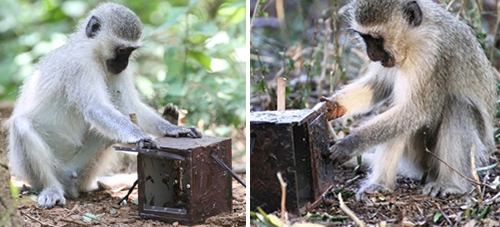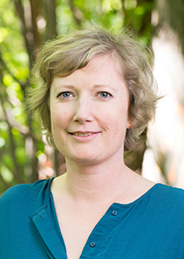Cultural Transmission in primates
At the core of modern biology lies a vast literature on evolution and its genetic basis. Less well researched is the ‘second inheritance system’, within which behavioural innovations are transmitted culturally, through social learning. However, recent years have seen an explosion of discoveries about such phenomena in fish, birds and mammals. Primate research has been particularly prominent in this, our team’s own foundational work on vervet monkeys now offers the promise of major new breakthroughs.
This project will yield unique insights into tradition formation in wild primates by adding an experimental approach to the commonly used observational approach. We are testing the effect of a model’s identity on the extent to which novel innovations spread, and also examine the spatial and temporal scales on which traditions may develop. The combined results will for the first time assess the role of social learning for behavioural phenotypes in a wild primate population, which should help us to better understand what makes our human culture so unique.
Linking Cognition and Social Strategies
During Prof. Erica van de Waal SNSF professorship grant, our group will focus on linking cognitive abilities to social integration and social learning strategies. Most of the research will be conducted on wild vervet monkeys at the Inkawu Vervet Project.
1) Lab cognition going wild
We plan to test the cognitive abilities of vervet monkeys belonging to different age/sex classes using touch-screens, a technology that is by now well established in laboratories. This technology will allow me to test in detail for various general cognitive processes as well as specifically social cognition, such as facial recognition of in-group vs out-group members as well as familiar and unfamiliar humans. A comparison with captive individuals from sanctuaries in South Africa will validate the approach.
2) Shift focus to dispersing sex
We intend to investigate the specific challenges for dispersing vervet males linked to integration into a new group and obtaining high social status, and to conduct experiments to test the integration of males possessing knowledge about food that their new group does not know.
3) Starting a comparative approach on conformity
We propose to start with the most challenging aspect of cognitive research, the comparison between species. We will use experimental designs established to study social learning strategies in vervet monkeys to also test humans of different ages.

Field experiment on social learning, vervet monkeys manipulating a puzzle box with different opening techniques (van de Waal et al. 2015)

A photograph from the follow-up experiments of van de Waal et al. (2013) showing a group of vervets crowding around their preferred colour of corn (pink) and avoiding the other (blue)
Prof. Erica van de Waal is the Director of the Inkawu Vervet Project, in Mawana Game Reserve, South Africa. This fieldsite consists of a framework of a large collaborative project between the universities of Lausanne (Prof. E. van de Waal), Neuchatel (Profs. R. Bshary & K. Zuberbuehler) and Zurich (Profs. C.P. van Schaik & M. Krützen) testing experimentally the evolution of social behaviour in vervet monkeys (Cholorocebus Pygerythrus). We have been studying several groups of wild vervet monkeys of this population since 2010, and thus over 200 monkeys are fully habituated and trained to multiple experiments.

From the individual to the system: Understanding knowledge movement (KNOWLEDGE MOVES)
A major challenge of the Anthropocene is for individuals to adapt to rapidly changing environments. In long-lived species, adaptation will require successful innovations to spread efficiently through social units, emphasising an increasing role of social learning and culture. Given that humans are the most cultural species on the planet, what factors limit or enhance social transfer in other species?
Vervet monkeys are an ideal model species to study knowledge flow due to their social structure, with males migrating multiple times within their lifetime. Moreover, our field site, we are uniquely placed to conduct experiments on multiple groups. At the individual level, using innovative technology (bio-loggers and molecular tools), we will detect how males adjust to their new physical and social environment following migration with respect to dialects and diet, and respectively how groups adapt to migrants. To test how information spreads, we will conduct experiments using novel touchscreen technology to discover whether migrants always conform to their new group’s knowledge or if groups can learn from migrants. Quantitative models based on the vervet data will be constructed to capture information spread at group and population levels. Primates being living links to our past, comparing these models to the existing literature on humans will reveal to what extent social transmission seen in humans is common throughout the primate lineage, and what differences make human culture so unique. By linking ground-breaking approaches in the wild with modelling work, this project will revolutionise our current knowledge of social information transmission within primate societies. Understanding information movement under changing environments will improve our ability to predict how primates will cope with the constantly increasing human impact and an unpredictable future, as well as refine our understanding of the uniqueness of cultural transfer in humans.
Group leader
Staff & Post-docs
- Dr. Ebi Anthony George
- Jakob Matto
- Dr. Vedrana Slipogor Milli
- Dr. Alba Motes Rodrigo
- Céline Schmuziger
- Dr. Judith Schneider
External Scientific Collaborator
- Mawa Dafreville
- Maria Granell Ruiz
- Rachel Harrison
PhD students
Master students
- Juliette Lemoine
- Lucas Zermatten
Former group members
- Axelle Bono
- Dr. Christèle Borgeaud
- Miguel Garcia Gareta
- Lucie Meier
- Tecla Mohr
- Anaïs Rilly
- Adarsh Sitapati, in co-supervision with Prof. van Schaik (University of Zürich)
- Alvaro Sobrino, in co-supervision with Prof. Bshary (University of Neuchâtel)
- Dr. Matthias Wubs

